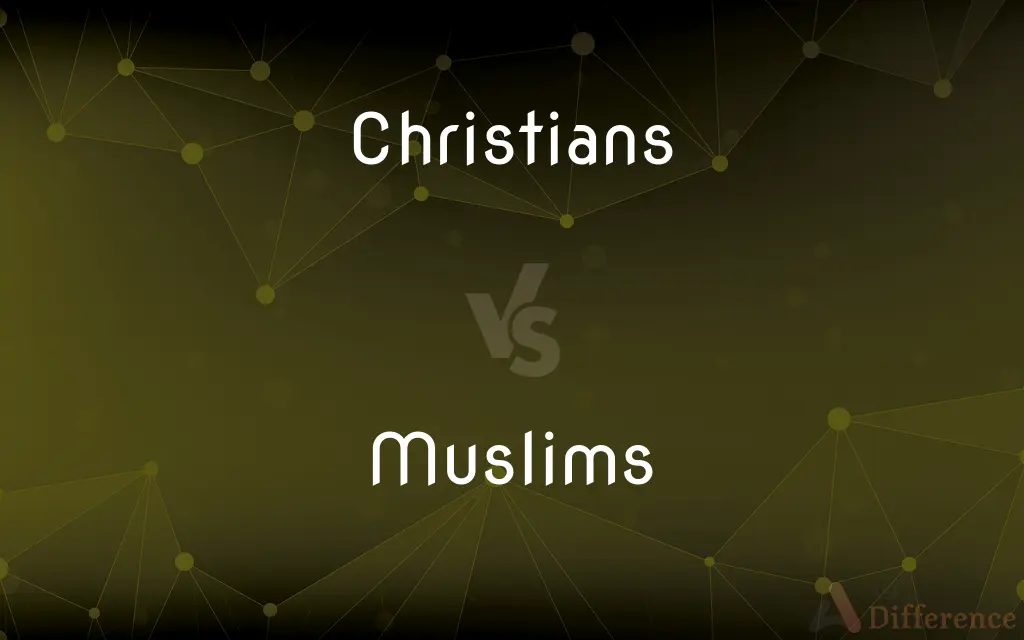Christians vs. Muslims — What's the Difference?
By Maham Liaqat & Fiza Rafique — Updated on March 21, 2024
Christians follow Christianity, based on Jesus Christ's teachings, believing in the Holy Trinity. Muslims adhere to Islam, centered on the Quran and the prophet Muhammad's teachings, emphasizing monotheism without the Trinity concept.

Difference Between Christians and Muslims
Table of Contents
ADVERTISEMENT
Key Differences
Christians are followers of Christianity, a religion grounded in the teachings and life of Jesus Christ, who is considered the Son of God and the savior of humanity. On the other hand, Muslims follow Islam, a monotheistic faith based on revelations received by the prophet Muhammad, whom they consider the last prophet sent by God. The Quran, their holy book, contains these revelations and serves as a guide for faith and practice, emphasizing submission to the will of Allah (God).
In Christianity, the concept of the Trinity is central, describing God as one being in three persons: the Father, the Son (Jesus Christ), and the Holy Spirit. This concept underscores the unique Christian understanding of God's nature and relationship with humanity. Whereas Islam strictly adheres to the oneness of God (Tawhid) and rejects the Trinity, emphasizing that Allah is singular, unique, and indivisible, Muslims regard Jesus as a prophet and messenger of God but not as divine or the son of God.
Salvation in Christianity is often understood through faith in Jesus Christ as the savior and the acceptance of his sacrifice on the cross as atonement for humanity's sins. Different Christian denominations might have varied interpretations of salvation and the means of achieving it, including faith, good deeds, and sacraments. Conversely, in Islam, salvation is achieved through belief in the oneness of God, the prophets, and following the Five Pillars of Islam—faith, prayer, charity, fasting during Ramadan, and pilgrimage to Mecca. Good deeds and submission to God's will are emphasized as paths to paradise.
Christian practices and worship can vary widely among denominations but typically include participation in sacraments such as baptism and communion, prayer, and reading the Bible. Worship services, rituals, and the celebration of religious holidays like Easter and Christmas are central to Christian life. Meanwhile, Muslim practices include the Five Pillars, daily prayers (Salah), fasting during Ramadan, giving to charity (Zakat), and the pilgrimage to Mecca (Hajj). Muslims also observe two major holidays: Eid al-Fitr, marking the end of Ramadan, and Eid al-Adha, commemorating the willingness of Abraham to sacrifice his son in obedience to God.
The role of religious leadership and community structures also differs between the two. In Christianity, there is a wide range of leadership roles, including priests, ministers, pastors, and bishops, varying by denomination with different traditions and governance. Islam's religious leadership includes imams and scholars who lead prayers, provide education, and offer guidance on Islamic law (Sharia), with no central religious authority akin to the papacy in Catholicism.
ADVERTISEMENT
Comparison Chart
Core Belief
Belief in the Holy Trinity; Jesus Christ as savior
Monotheism; Muhammad as the last prophet
Holy Texts
Bible (Old and New Testaments)
Quran
Concept of God
God in three persons: Father, Son, Holy Spirit
One God (Allah), unique and indivisible
Salvation
Through faith in Jesus Christ
Through faith, good deeds, and following the Five Pillars
Practices
Sacraments, prayer, worship services
Five Pillars, daily prayers, fasting, charity, pilgrimage
Religious Holidays
Easter, Christmas
Eid al-Fitr, Eid al-Adha
Leadership
Priests, pastors, bishops
Imams, scholars
View of Jesus
Son of God, divine, savior
Prophet, not divine
Worship Services
Church services, communion, baptism
Mosque prayers, Jummah (Friday prayer)
Concept of Afterlife
Heaven and hell based on faith and God's judgment
Paradise and hell based on deeds and God's judgment
Compare with Definitions
Christians
Celebrate Easter to commemorate Jesus's resurrection.
Many Christians wear special attire for Easter services.
Muslims
Observe Ramadan through fasting.
Muslims fast from dawn to sunset during Ramadan to practice self-discipline.
Christians
Followers of Christianity, believing in Jesus Christ's divinity.
Christians attend church services to worship.
Muslims
Perform the Hajj at least once if able.
Millions of Muslims travel to Mecca annually for the Hajj pilgrimage.
Christians
Read the Bible as their holy scripture.
Christians often study the Bible in their personal and communal worship.
Muslims
Celebrate Eid al-Fitr and Eid al-Adha.
Muslims around the world prepare feasts and give to charity during Eid celebrations.
Christians
Participate in baptism and communion.
Christians receive baptism as a sign of faith and belonging to the community.
Muslims
Followers of Islam, emphasizing submission to Allah.
Muslims perform five daily prayers facing Mecca.
Christians
Believe in salvation through Jesus Christ.
Christians teach that faith in Jesus is the path to eternal life.
Muslims
Read the Quran as their holy scripture.
Muslims recite verses from the Quran in their daily prayers.
Christians
Christians ( (listen)) are people who follow or adhere to Christianity, a monotheistic Abrahamic religion based on the life and teachings of Jesus Christ. The words Christ and Christian derive from the Koine Greek title Christós (Χριστός), a translation of the Biblical Hebrew term mashiach (מָשִׁיחַ) (usually rendered as messiah in English).While there are diverse interpretations of Christianity which sometimes conflict, they are united in believing that Jesus has a unique significance.The term "Christian" used as an adjective is descriptive of anything associated with Christianity or Christian churches, or in a proverbial sense "all that is noble, and good, and Christ-like." It does not have a meaning of 'of Christ' or 'related or pertaining to Christ'.
Muslims
Muslims (Arabic: مسلم, romanized: Muslim) are people who follow or practice Islam, a monotheistic Abrahamic religion. The derivation of "Muslim" is from an Arabic word meaning "submitter (to God)".
Christians
Professing belief in Jesus as Christ or following the religion based on the life and teachings of Jesus.
Muslims
Also Mos·lem (mŏzləm, mŏs-) A believer in or adherent of Islam.
Christians
Relating to or derived from Jesus or Jesus's teachings.
Muslims
A member of the Nation of Islam; a Black Muslim.
Christians
Manifesting the qualities or spirit of Jesus, especially in showing concern for others.
Christians
Relating to or characteristic of Christianity or its adherents.
Christians
One who professes belief in Jesus as Christ or follows a religion based on the life and teachings of Jesus.
Christians
One who lives according to the teachings of Jesus.
Christians
Plural of christian
Common Curiosities
Can you describe a major religious practice that differs between Christians and Muslims?
Christians participate in sacraments like communion, while Muslims practice daily prayers and fasting during Ramadan as part of their faith.
How do the two religions differ in their worship services?
Christian worship services often include hymns, sermons, and communion, whereas Muslim prayers involve specific physical postures and recitations in Arabic.
What are the key religious texts for Christians and Muslims?
Christians follow the Bible, and Muslims follow the Quran.
What is the primary difference in belief about Jesus between Christians and Muslims?
Christians believe Jesus is the Son of God and divine, while Muslims respect him as a prophet but not divine.
How do Christians and Muslims view the afterlife?
Both believe in an afterlife where individuals are rewarded or punished based on God's judgment, but Christians emphasize faith in Jesus for salvation, whereas Muslims emphasize deeds and submission to God's will.
What is the Holy Trinity in Christianity?
The Holy Trinity in Christianity refers to the belief in one God in three persons: the Father, the Son (Jesus Christ), and the Holy Spirit, each distinct yet fully God.
What is the significance of religious leadership in both faiths?
Christian religious leadership varies by denomination and includes roles like priests and pastors, while Islamic leadership involves imams and scholars who guide prayers and interpret Islamic law.
What role does Jesus play in Islam compared to Christianity?
In Islam, Jesus is a highly respected prophet and messenger of God, while in Christianity, he is the central figure of the faith, believed to be the Son of God and savior.
How do Christians and Muslims approach prayer?
Christians pray in diverse ways, including personal, communal, and liturgical prayers, without a prescribed posture, often seeking a personal relationship with God. Muslims perform Salah five times a day facing Mecca, using specific physical postures and recitations in Arabic, as a direct link to God.
How do Christians and Muslims view salvation?
Christians see salvation through faith in Jesus Christ, while Muslims believe in salvation through good deeds, faith, and adherence to the Five Pillars.
How is religious scripture used differently in Christianity and Islam?
In Christianity, the Bible is used as a historical and spiritual text that guides faith and practice, incorporating narratives, teachings, and prophecies. In Islam, the Quran is considered the literal word of God revealed to Muhammad, guiding all aspects of life and worship with a direct commandment style.
What are the Five Pillars of Islam?
The Five Pillars of Islam are the foundation of a Muslim's faith and practice, comprising Shahada (faith), Salah (prayer), Zakat (charity), Sawm (fasting during Ramadan), and Hajj (pilgrimage to Mecca).
What role do prophets play in Islam?
In Islam, prophets are messengers sent by God to guide humanity to the right path. Muslims believe in many prophets, including Adam, Noah, Abraham, Moses, Jesus, and Muhammad, with Muhammad being the last prophet.
How do Christian and Muslim communities differ in their global distribution?
Christianity and Islam are widely practiced around the world, with Christianity having significant populations in the Americas, Europe, and parts of Africa and Asia, while Islam has major populations in the Middle East, North Africa, parts of Asia, and Indonesia, making it the dominant religion in those regions.
What is the significance of religious holidays in Christianity and Islam?
In Christianity, holidays like Easter and Christmas are central, celebrating the resurrection of Jesus and his birth, respectively, highlighting key aspects of Christian faith. In Islam, Eid al-Fitr and Eid al-Adha are significant, marking the end of Ramadan and commemorating Abraham's willingness to sacrifice his son, emphasizing themes of sacrifice, community, and God's mercy.
Share Your Discovery

Previous Comparison
Jewel vs. Joule
Next Comparison
Background vs. ObjectiveAuthor Spotlight
Written by
Maham LiaqatCo-written by
Fiza RafiqueFiza Rafique is a skilled content writer at AskDifference.com, where she meticulously refines and enhances written pieces. Drawing from her vast editorial expertise, Fiza ensures clarity, accuracy, and precision in every article. Passionate about language, she continually seeks to elevate the quality of content for readers worldwide.














































